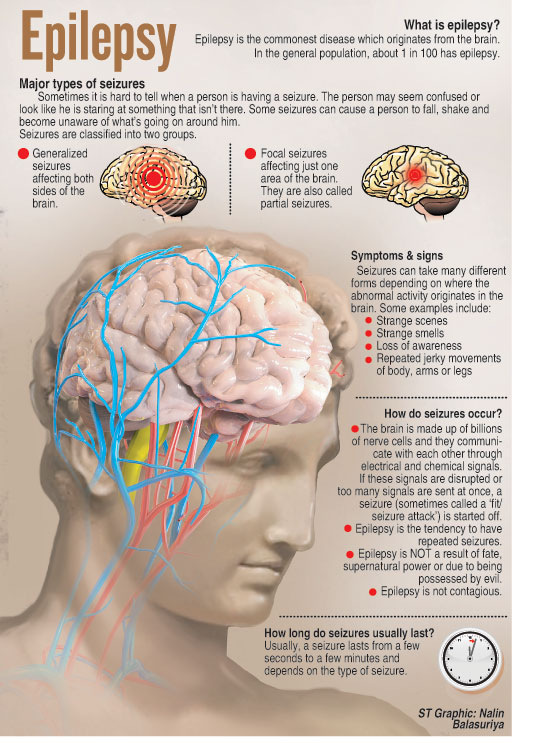Do not fear Epilepsy, it’s treatable
View(s):By Kumudini Hettiarachchi
Till their one and only son was 11 years old, there was no inkling of an issue with his health.
The first sign came when Amma and Putha were returning home to Ratmalana after school……..“He suddenly fell on the road,” says the boy’s father, as if it was a kalanthayak (fainting spell). In a moment, he was up again and after a gulp of water proceeded home.
The second episode came two weeks later, when father and son were playing on the bed just before sleep time, once again with a sudden fall. “Kshanikawa negitta,” says the father, explaining that the boy got up immediately.
The terrified parents rushed him the very next day to the doctor whom they usually consult in the area who prescribed some medicine but also advised them to be watchful. The frequency of the seizures (fits) within the next week became more rapid and his son would also shiver uncontrollably. When asked, the boy simply had no recollection of what had happened to him.
Directed to the Lady Ridgeway Hospital for Children, the boy came under the care of Paediatric Neurologist Dr. Jithangi Wanigasinghe and all possible tests including an Electroencephalogram (EEG) were done, with the diagnosis that it was epilepsy.
Even with all the assurances that the parents should not worry and epilepsy is not only treatable but also controllable, the pressures from relatives and friends were immense to hold a thovil or take the boy to that or this person to charm away this doshaya.
The father, however, was adamant and follow they did the advice of Dr. Wanigasinghe and her team.
“From January 2014 up to now (three years), the boy has had no seizures,” the relieved father says, adding that now the medications are also being reduced. Epilepsy is just like any illness such as asthma, says Dr. Wanigasinghe, reiterating that it is treatable and controllable. It is the commonest disease which originates from the brain and around 1 in 100 people has it. (See graphic)
“There is no reason to fear it,” she says, answering a common question. If a person has a seizure, does it mean that person has epilepsy? “Not always,” she says, adding that seizures can also occur because of other medical problems such as a high fever, low blood sugar and alcohol or drug withdrawal.
Referring to the diagnosis of epilepsy, she underscores that as it is based on clinical features, it is very important to document what is seen when a person is having a fit. Relatives or friends should keep tabs about the episodes, before, during and after, what the duration is and also the frequency.
Once the diagnosis is made, the treatment of epilepsy to stop or lessen seizures includes:
- The commonest treatment is anti-seizure drugs or medicines.
- Surgery – if seizures are from a single area of the brain (focal seizures), surgery to remove that area may stop future seizures or make them easier to control with medicine. Surgery is mostly used when the seizure focus is located in the temporal lobe of the brain.
- Other treatment — when medicines do not work and surgery is not possible, other treatment includes vagus nerve stimulation, where an electrical device is placed or implanted under the skin on the upper chest to send signals to a large nerve in the neck. Another option is the ketogenic diet, a high fat, low carbohydrate diet with limited calories.
When asked whether epilepsy can be cured, this Paediatric Neurologist says that medicines will help stop the seizures and this happens in most patients. However, in some, they will only reduce the seizures. Medication should never be adjusted or stopped without the doctor’s advice and if a woman with epilepsy is planning to become pregnant, she must necessarily inform her doctor.
Pointing out that sometimes epilepsy can be prevented, she says that the most common way to reduce the risk of developing epilepsy include having a healthy pregnancy, as some problems during pregnancy and childbirth may lead to epilepsy. “Keep yourself and your baby healthy by preventing brain injuries; lower the chances of stroke and heart disease; make sure all vaccinations are taken; and wash your hands and prepare food safely to prevent infections.”
However, if a person is diagnosed with epilepsy, self-management goes a long way, MediScene understands. Manage the seizures and lead an active life. Take the medications, seek answers from the doctor if there are any questions, recognize the seizure triggers such as flashing or bright lights, keep a record of the seizures, have enough sleep and reduce stress levels.
“Women who have epilepsy face special challenges,” says Dr. Wanigasinghe. “Hormonal changes can cause some women with epilepsy to have more seizures during their period. There are also special concerns about pregnancy because having a seizure and taking certain drugs during pregnancy may increase the risk of harm to the baby. This is why women who are planning to become pregnant should inform their doctor and be advised on how best to take care of herself and her baby.”
Addressing the concern whether someone with epilepsy can engage in exercise, she says that exercise is rarely a “trigger” for seizures. Regular exercise may, in fact, improve seizure-control. While avoiding sports-related injuries that can increase the risk of seizures, safe sports can be good for the person’s physical, mental and emotional well-being.
In Sri Lanka, MediScene learns that usually Consultant Paediatricians treat children with epilepsy, while Consultant Physicians look after adults. Paediatric Neurologists and Neurologists are available in tertiary-care hospitals where they conduct special epilepsy clinics and provide advanced care for children and adults.



